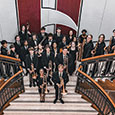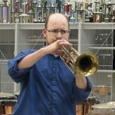There is so much to do at the Midwest Clinic that many people never visit the jazz side of the convention. Each year, these students dazzle audiences, just like their classical counterparts. I interviewed the high school and junior high jazz directors bringing groups to perform at the 2023 Midwest. Some were chosen on the first try, others made it after multiple applications, and one is bringing her group for the third time. We discussed the challenges of making the audition recording and polishing the charts for such a prestigious performance. We covered the fun and surprises along the way. Most of all, they shared the excitement of becoming one of the few selected to swing in Chicago.
Jeremy Lumpkin
The Hillgrove High School
Jazz Orchestra
Powder Springs, Georgia
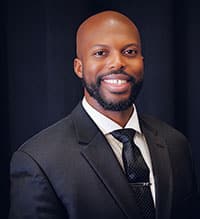 Jeremy Lumpkin is in his fourth year at Hillgrove High School, where he directs the marching band, wind symphony, concert band, and jazz orchestra. His group is the first jazz band from Georgia to perform at the Midwest. He also taught for five years at Collins Hill High School in Suwanee, Georgia.
Jeremy Lumpkin is in his fourth year at Hillgrove High School, where he directs the marching band, wind symphony, concert band, and jazz orchestra. His group is the first jazz band from Georgia to perform at the Midwest. He also taught for five years at Collins Hill High School in Suwanee, Georgia.
Deciding to Apply
Jazz band here meets after school 4 or 5 hours a week but only in the spring. My first year at the school was during the pandemic, and we didn’t do much. In the second year we started the jazz band and played our assessment, which went well. I submitted the assessment tape to the state conference, we got in, and in the third year, we played at the state conference.
I wanted to see how far we could go. I sent the state conference recording to Midwest, and now we are going to Chicago. It’s a young band with only a few seniors, but the students are classically trained and took an interest in jazz. You can see in their performance that they are passionate about what they do. Their goal this year is to put on a good concert and have a good time doing it. We are hoping that kids have bitten the bug. We now have 90 kids who want to swing.
Changing Band Membership
After submitting our tape, fourteen seniors graduated. My soloists weren’t seniors but some of the people who made the band pop graduated. I knew some strong-minded kids coming up would rise to the occasion, and they have. The young kids came in and worked even harder because they knew how big this was. I’m really proud of them. Any nerves involved picking music, which made me lose all my hair.
After selecting music, I gave students seven days to learn the notes. Some did, and some didn’t. I told them that Midwest was about the journey. The concert is the icing on the cake, but I want us to grow as musicians and people. I want our work to be only positive. The kids are mature about it but keep the light nature of teenagers. They are excited about the performance but are more excited about pizza and ice skating.
They may not understand the importance of the performance until they get older. I am selfishly excited because I never thought I would set foot on that stage. I got out of the shower, checked my phone, and saw an email from Midwest. I’m thankful and blessed.
Selecting the Music
There is a lot to learn about selecting the music, and what Midwest wants audiences to hear. The conference features significant amounts of new music from a diverse range of composers and publishers. We are playing a piece called The Moment of Truth by Australian composer Roger Schmidli. It opened my ears to all kinds of music. For every piece I picked, I probably listened to 50 others.
As we work on the music, I remind myself not to expect perfection. I stay positive but make sure players know this is the highest of the high level. When we get on stage, we will make mistakes. We talk in rehearsal about how we will recover. We have to swing as hard as we can so those mistakes are forgiven. I remind them that we were good enough to make it on stage, so we ought to have to have fun.
Some in the audience will compare their jazz bands to ours. I want that to happen because people shouldn’t think Midwest is out of reach. Our program is four years old. These students don’t take jazz lessons; they take classical lessons and are good musicians, but they came in with a passion for jazz and wanted to learn.
Lightbulb Moments
I love when the lightbulbs go on for students. I like to teach through questions. If we do a run of a chart or a section, I might ask, what did you think? They offer educated answers, questions, and critiques of their peers. Students listen to the critiques without getting mad and defensive. The conversations in rehearsal are well-spoken, and they are right. This tells me that they are doing their work. I love seeing kids work hard and discover that the sky is the limit.
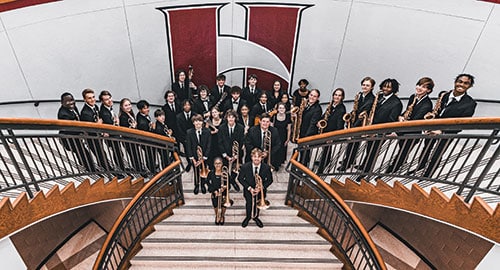
Sallie Vines White
Hoover High School First Edition
Jazz Band
Hoover, Alabama
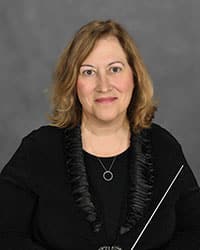 Sallie Vines White is in her 39th year of teaching and has taught in the Hoover City Schools since 1990. She also taught for five years in the Bessemer City Schools. She directs two jazz bands, a symphonic band, and teaches AP Music Theory. She also serves as associate director for competition and football marching bands. This is her third trip to the Midwest Clinic with the top jazz group, First Edition.
Sallie Vines White is in her 39th year of teaching and has taught in the Hoover City Schools since 1990. She also taught for five years in the Bessemer City Schools. She directs two jazz bands, a symphonic band, and teaches AP Music Theory. She also serves as associate director for competition and football marching bands. This is her third trip to the Midwest Clinic with the top jazz group, First Edition.
At Home in Hoover
Hoover is a suburb of Birmingham, Alabama, with a population of 92,000. I love the community and my students. We have a large band program and march about 350 students and have four concert bands and three full jazz bands, including Hoover First Edition. For marching, we have a football band that everyone participates in and a smaller competition band that does BOA competitions and similar events.
Rehearsing
We meet daily for 49 minutes during seventh period. While preparing for Midwest, we added a 90-minute Wednesday afternoon rehearsal. During marching camp, we tried to rehearse a couple of times a week with the new group, which, of course, does not include seniors who graduated. We are blessed to give a lot of performances, including a Veteran’s program and a Christmas program with entirely different music from our Midwest repertoire. We sightread often and have a lot of things in our book, but Midwest music is what we have been working on the most this year.
The Application
We performed at Midwest in 2012 and 2018 and because you can only audition every five years, I planned to audition again as soon as possible since next year will be my 40th year of teaching. Last year’s group was really strong, and we participated in the Loyola Jazz Festival, which always makes a great recording of your performance. I used two songs for the audition recording from that performance. I made a mistake during the third number of getting the audience to clap, which made it harder to stay together. My first reaction was that I ruined that recording. We ended up having to re-record that piece, but it worked out.
Musical Lessons
Their sightreading has jumped leaps and bounds as we evaluated music for our Midwest concert program. I did pick a program that is hard on the brass chops. If I could do it over, I would back off on a couple of tunes. At Midwest, you play music at every grade level because they want your performance to apply to everybody in the audience. We are doing a few easier charts, but they have the brass blowing the whole time. I am excited to present our program.
Picking Charts
Having taken a group to Midwest twice before, I had a notion of what I wanted to do. Quite a few of the charts I wanted to program were performed in the last couple of years and were not eligible for this year. I love Alan Baylock’s music and many of his charts were played recently. I learned from my previous experiences to be at the computer when they open the music reservation time. I had a list of several newer tunes that I wanted and hit these selections first. Preparing for Midwest is a learning process with many deadlines and requirements. It was wonderful enough the first two times that I wanted to do it a third time. I’m glad it worked out.
Special Guests
Marcus Printup, who plays trumpet in Jazz at Lincoln Center, is our guest artist. Many years ago, we used to participate in a competition called Swing Central Competition. If you were selected as a finalist, they sent a clinician to your school. Wycliffe Gordon came here a couple of times, and Marcus Printup also came once. He’s a wonderful musician and person, and we have stayed in touch through Facebook.
Our football program was featured on an MTV show called Two-A-Days, and Marcus had seen that. I wanted to get him as our guest artist this time, having had Wycliffe Gordon, Todd Stoll, and Jim Pugh for previous Midwest performances. He is also performing with Hillgrove High School at the convention. I am happy that my students will get to hear him and know him.
We have several directors on staff here who will be our guest directors, including Director of Bands Ryan Fitchpatrick, our assistant Matthew Cicero who directs the third jazz band, and Jeff Fondren, our percussion instructor. They will all direct a song, and I’m excited they are part of the program. They are wonderful colleagues.
Favorite Songs on the Program
My favorites include the one that Marcus is going to play, Tutti for Cootie by Duke Ellington and El Alma de la Banda (The Soul of the Band) by Gordon Goodwin, which is a really fun chart. Brian Kidd, who used to write for the Navy Commodores, wrote a recently published jazz waltz called Leading the Way, and he gave me a copy. It is different from anything we are playing and has a wonderful sax soli. One of my favorites, the only one we are doing from one of my earlier Midwest performances, is a Jeff Jarvis tune called Bistro Latino. It’s a tough but fun chart.
Program Strengths
One of the many times we we were performing at the Loyola Jazz Festival, two of the judges wrote on their sheets, “You need to audition for Midwest.” They were leaders in jazz education and that gave me a lot of confidence. The kids work hard here, we have fun, and we love it. You never know until you try, so we keep trying. I have a great passion for jazz education and always try to pass along the joy I have found in playing and teaching jazz.
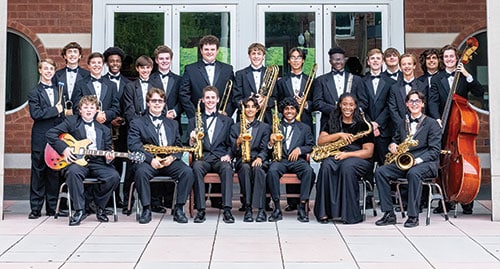
Aldo Christopher Morales
Del Rio High School Jazz Ensemble
Del Rio, Texas
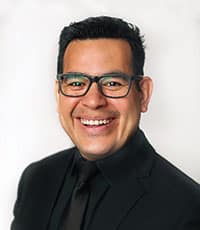 Aldo Christopher Morales is in his second year as Director of Bands at Del Rio High School in Texas. He spent ten years as the primary conductor of various Del Rio Non-Varsity School Bands. He currently directs the Marching Band, Wind Ensemble, and Jazz Ensemble at Del Rio and oversees and assists all aspects of the Concert Band and Symphonic Winds. This is his first invitation to take a group to Midwest.
Aldo Christopher Morales is in his second year as Director of Bands at Del Rio High School in Texas. He spent ten years as the primary conductor of various Del Rio Non-Varsity School Bands. He currently directs the Marching Band, Wind Ensemble, and Jazz Ensemble at Del Rio and oversees and assists all aspects of the Concert Band and Symphonic Winds. This is his first invitation to take a group to Midwest.
Deciding to Apply
In the years just before COVID we started having a competitive jazz program. We traveled to various festivals in Texas and placed well against groups accepted by Midwest in the past. We started thinking that we could dip our toes in and submit an application. We sent in recordings in 2019 and 2021. This year we made it.
Our recording included Caravandalized, written by Duke Ellington and based on the famous jazz standard Caravan but with a rambunctious New Orleans sound. Australian composer Tim Davies arranged the piece, and the kids really enjoyed it, so we recorded it along with two songs out of the Essentially Ellington Library. One was Roll ‘Em by Mary Lou Williams. We had a talented senior clarinet player who knocked this out of the park. We did another song called Across the Track Blues by Duke Ellington, a slow piece that mimics the sounds of a train throughout. It uses the ensemble in different ways to create those sonorities.
The students were excited when we were accepted. Kids in the second jazz band really started practicing and showing a new commitment to jazz. When we held auditions in late May, students were well prepared because they wanted to be part of this group. It was the first Midwest invitation for our school. We were already a strong program, and the Midwest invitation took us to another level.
Joy and Passion
As teachers we all have our vision where our kids have bought in just as much as we have. It can be difficult to achieve because they are teenagers and most aren’t going to major in music. Our students are so motivated right now because of the end goal. That makes me happy because having students who are so passionate may only happen in the most competitive programs. I’m really enjoying that our standards can be much higher, which allows us to do what we imagine when we major in music and think of leading a group.
Surprises
I think the main surprise was how much things halted at the beginning of school. We auditioned students in May and started practicing towards the middle of June. There was no marching camp competing for our time. Sometimes we had five hours in the band hall. We did sectionals and full ensemble work through the end of June. When we dismissed students by about the 4th of July, it felt like we were about halfway through our preparations. We could play through our program of nine pieces, and everything was coming together. Our soloists were already knee deep in the process.
During the summer our marching band usually rehearses three times a week, and then we have a game on Friday and a marching competition on Saturday, which doesn’t leave much time for jazz. We also had region jazz auditions on September 26. On our day off from marching, we came in after school and dove into our individual etudes for the region. All of this halted our progress until the region auditions and marching ended.
We picked up the pieces in early October and feel good about our progress. You might start a song that you haven’t played in a couple of weeks and feel a little worried, but with good musicians it gets good really fast. That lets you relax a bit and feel like you can breathe.
I have talked to George Andrikokus at Hinsdale Middle School (also invited to the 2023 Midwest) on the phone, and we have shared advice with each other. He can get much more done without the marching season. In our program, jazz takes more of a backseat because marching takes the forefront during the fall. Trying to keep the ship afloat with all these simultaneous duties has been the most difficult part. We feel confident and see the light at the end of the tunnel.
Special Guests
Ray Vasquez, a trumpet teacher from Brownsville, who is coming up with the Rio Grande Valley Jazz Orchestra, is actually a Del Rio alum from back in the 1990s. Another former student, David Zamora, is a college jazz studies major. He is playing with us and also helped during the summer before returning to college in August. He really was knee deep with the rhythm section. We have tried to include people with Del Rio ties partly because we are a Title I school. Most of our kids have never been on a plane before so you know funds are tough to come by. We ran concession stands at the football games and sold merchandise online.
We didn’t have lots of extra money to bring in guest artists, so we tailored our expectations. It is so rare for a Title 1 school to reach this level. We are on the border and can see Mexico from where marching band practices. Many students have family over there. They are wonderful kids, but it is a different world compared some groups. I love that we can give this experience to kids at this level. That is the most rewarding part.
Community Support
We had to educate people about the Midwest Clinic. We are isolated geographically in a city of about 40,000 people. The nearest town is about 54 miles away and has 60,000 people. San Antonio is about 150 miles away. Our district has been great about supporting us. They are going to pay for our transportation to the airport and our meals on the trip. We had to fundraise for lodging and flights. The community learned that it was a big deal.
The recording we did over the previous three years actually became part of our curriculum. We would play back the recording and ask the saxophones “are you balancing to the lead?” Students didn’t mind that we were recording. We knew that we had a good group, and if we were selected, eventually that would be great. We knew that you can’t win unless you’re in.
Recording also has lessons for life. When you go out to perform, it is one and done. It’s different when you are going through it with the kids, and we tell them to pretend we’re on stage. It is difficult to get in that mindset. When the recording goes on, they feel the pressure of a live performance. The more times we get them in that situation where they are really focused on what they are trying to do, the more it will pay off later.
Special Stops in Chicago
When we get off the plane in Chicago, we are headed straight to Hinsdale Middle School to see them rehearse. George has been great about scheduling that with his administration. I look forward to meeting a middle school band that can reach that level. As a nerdy educator, that excites me.
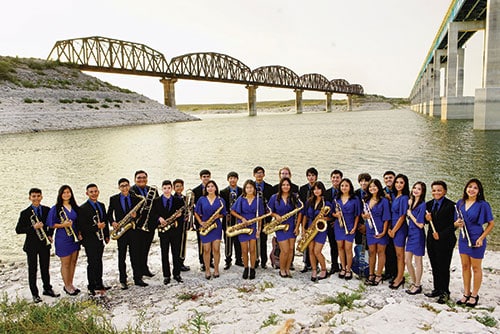
George Andrikokus
Hinsdale Middle School Jazz Ensemble
Hinsdale, Illinois
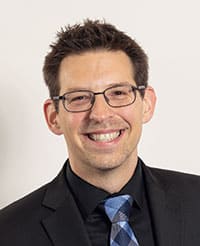 George Andrikokus is director of bands and instrumental jazz programs at Hinsdale Middle School in Illinois. He has also taught in the Addison School District #4 and Bensenville School District #2, both also in Illinois. He is a graduate of Elmhurst University and will lead a group at Midwest for the first time this year.
George Andrikokus is director of bands and instrumental jazz programs at Hinsdale Middle School in Illinois. He has also taught in the Addison School District #4 and Bensenville School District #2, both also in Illinois. He is a graduate of Elmhurst University and will lead a group at Midwest for the first time this year.
Life in Hinsdale
Hinsdale is about 20 miles west of Chicago. The community and school district supports the arts and everything we do, especially the jazz ensemble. Our students play their regular gigs throughout the year which include opening for local big bands in and around the Chicago area. We had a piece written for our Midwest performance, and the cost came out of our budget, with some help from our amazing PTO. Parents have helped us with fundraising to offset the cost of transportation and to reduce the overall cost of the trip for students. Living close to Chicago makes the trip less expensive, but we want to get the full experience with coach buses and a group dinner in the city after our performance.
Applying to Midwest
In 2019 we performed at the Illinois Music Educators Conference, and I felt if we could keep on this trajectory we could have a shot at Midwest down the road. Coming out of COVID, we had a group of really strong 6th and 7th graders who were passionate about playing music and jazz, so as we were rehearsing and performing, everybody caught the bug to perform more. We had a successful year in 2021 so I decided to put a recording date on the calendar for the following year to apply to perform at Midwest, and told the band about the plan. If it worked out, great. It was fine either way for us because the live recording process would be an educational opportunity for our students. Last year we also had far less than 75% of the band graduating at the time. We had depth in numbers of really high-quality 6th and 7th grade players, and this year’s band has three 6th graders in it who auditioned and filled vacancies. I can’t imagine doing as well as they are with only one year of playing experience. It was the perfect window for us and on December 20th we get to be part of history.
Learning from the Process
Over the last couple of months, students have realized that we need to put on an entertaining show beyond playing the music. Our set has been meticulously put together with a mix of swing and Latin tunes in various keys and tempos. There’s a ballad in there as well; we really tried to hit every element. Our Motown closer is a lot of fun, too. I gave considerable thought to the arc of the concert and the impact it will have on the audience.
I picked literature carefully to make sure the levels of music were balanced for the students, and it doesn’t stray too far from what we would play in a normal year. We had some rehearsals and small group work over the summer, so it was business as usual for us but just a bit expedited with the December performance. At this point in the fall, we have rehearsed two hours on Tuesday evenings and two hours on Thursday afternoons to allow us to prepare the music at the highest level possible.
Most Enjoyable Part of Preparing
Our rehearsals always feel fresh and challenging because there is so much music to prepare. It’s like a giant puzzle, and I love puzzles. The bond between students outside of rehearsal is exciting to see because we are together much more this year. Retired Northern Illinois University Jazz Director Ron Carter came in to work with the band. We had a rehearsal, pizza party, and a screening of the documentary Chops, which features Ron Carter. It was wonderful for students to hang out together without instruments and build an even closer bond. The documentary captures the musical spark created by students just a few years older than them as they prepare for the Essentially Ellington Competition in New York. It shows that it is ok to be passionate and excited about making music together, and that taking big risks can lead to big rewards.
Sharing the Stage
I knew I wanted to have a variety of soloists and to feature key people in my development as an educator. First, I reached out to my professor Doug Beach, who is now retired from Elmhurst University. I am so fortunate to have learned under him, played in his band, and developed a relationship with him as a colleague. I wanted to play a Doug Beach chart at Midwest because his writing was, and continues to be, a staple for me as a jazz director. He will guest direct his tune and play with students on the final number.
Evon J. Sams was my first student teacher my first year at Hinsdale Middle School and is an amazing saxophonist and multi-instrumentalist. I asked him to perform with us because he can relate to kids and knows our program. He is doing great things as a professional musician and educator.
The final guest is trombonist Christopher Bill. I had seen his YouTube videos over the years and shot him a message. He responded, “Tell me the date. Let’s do it!” He is so versatile, a classical player with a jazz and funk background. Students really decided he was legit after seeing how many followers he has online. We are excited to make music with him.
Commissions
We are playing three commissions on our concert. The first, written by Ryan Adamsons, is a contrafact on the jazz standard Black Orpheus and was just picked up by a publisher. We have a tune by Michele Fernández which is an absolute jam. Finally, I have always admired Randall Standridge and his work. He is such a versatile composer, and I wanted to see if he would write a jazz commission, his first jazz chart, and it happens to be under his publishing company. We met and discussed ideas over Zoom. I am excited to premiere this tune, which is a great contrast for our program. It’s fusion, Latin, and has some cool cinematic and programmatic elements. It has an optional solo feature for one or more soloists. It is a masterful composition written with the performers in mind. Watching students bring it to life has been awesome. Our kids have put in the hard work on these charts, now we want them to let loose and enjoy this experience. We want to make our performance a celebration of music.
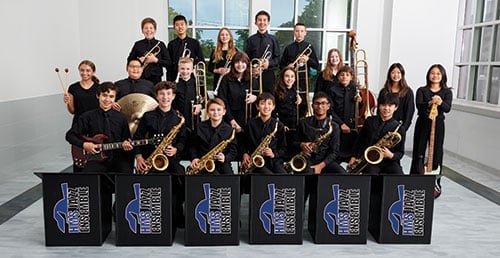
Elijah Ontiveros
Hornedo Jazz Ensemble
El Paso, Texas
Elijah Ontiveros is in his 4th year of teaching as the Assistant Band Director at Hornedo Middle School. He directs the Hornedo Symphonic Band, Hornedo Jazz Ensemble, and beginning brass. The Hornedo Jazz Ensemble was invited to perform at the 2023 TMEA convention and is making its first appearance at the Midwest Clinic.
The Motivation to Apply
We were invited to appear at the Texas Music Educators Association Convention and also earned first place in our last contest of the year. I decided to give Midwest a shot and submitted our winning competition recording and it was accepted. We had never applied before, and this will be my first time even attending the convention.
One challenge of preparing for Midwest is sending a recording in the spring, and then losing players who graduated. I asked our liaison for Midwest if we could bring some students who graduated as part of our group and learned that it doesn’t work that way. I didn’t know what to do.
I have learned how capable middle school students are. Many educators take that for granted, especially in the music world. We look at them and are surprised with what students can achieve. Earning an invitation to play for an international audience makes me proud to be with these kids every day, even when it is a struggle. It almost seems unreal. We have to take time to appreciate these moments that don’t happen often.
What Students Have Gained
My students have learned about themselves more than anything else. When I first passed out the music, we were headed into summer vacation, and some of the students were just finishing 6th grade. They had played just a few charts in the entire year and now had six or seven to learn over the summer without any jazz experience. Over the last several months, they are learning more than just music. They are becoming more responsible and managing their workload and time. I explained to them how big this performance is, and I think they understand, but they won’t get it until they see it with their eyes.
Best Part of the Process
We started school at the beginning of August. Jazz isn’t offered until 7th grade, so it is a thrill to see how much students have improved since they began with me. I can’t wait to see what they will do tomorrow, the next day, and the following week. Back in August, the preparation looked like a challenge that we might not pull off. Instead, we can play a high-level music for a large audience. That’s the exciting part for me.
Guest on the Program
I have a great mentor, Al Mendez, a retired band director and fine arts director who has done so much for music in El Paso. My teaching career began right after the world shut down. My first day in the classroom was on the laptop in a Zoom with groups of students I had never met. The following year we made it back to school, and I was in charge of the jazz band. I knew Al Mendez was the best person to bring in and tell me if I was going in the right direction. I reached out to him. He had no idea who I was and came to listen to my group two weeks before our winter concert. Right after that rehearsal, he told me that he was available every Thursday. He said, “I will be here every week because you have something special here.”
When I heard that from a man who was recently named Texas Bandmaster of the Year, it was gold. He was there for us before we received any recognition, so it was an easy choice to have him conduct a piece for us in Chicago.
I had a harder time selecting a guest artist. Last year, the University of Texas at El Paso Jazz Ensemble was also invited to play at TMEA. They had an amazing guest artist, Los Angeles trumpeter Willie Murillo. I got in touch with him and discovered that he was the most down-to-earth professional I have ever met. It felt like talking to a neighbor. I told him we had something good in December and asked if he would play with us. He said, “I’ve been featured in movies and on the Tonight Show, but my passion lies in education and with students. I am happy to be a guest artist.”
Favorite Music on the Concert
I really connected with Gordon Goodwin’s song dedicated to Sammy Nestico, My Man Sam. I’ve been a big fan of Sammy Nestico since I started playing jazz music. I listened to it online and decided it was a tough chart, but I have the kids to pull it off. I thought it was probably the hardest we could go. It is a song we have been hitting hard, and it’s coming along well.
Community Support
Our community has been really supportive. We are right across the border from Juarez, Mexico, and on the bottom slope of the West side of El Paso right underneath the Franklin Mountains. When I heard that we had been invited to Midwest, I knew we would have to ask our school district for support with expenses and were able to get some help. Most of the money came from students and our program overall. Reaching out to the parents, I told them that we had to make this happen.
Our jazz students raised $18,000 to contribute part of the trip expense, which will pay for meals, artist fees, one of the songs we’re getting commissioned, and t-shirts for the kids. The El Paso Community Foundation gave us a generous donation of $2,500. Our biggest support system is definitely our parents, who have really helped out. The parents and students made this possible.
